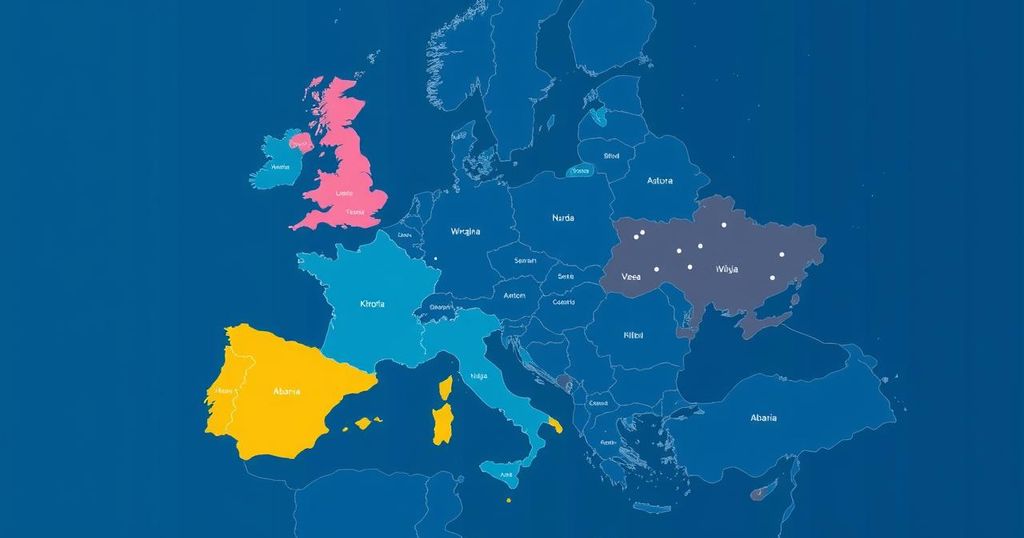EU’s Search for Third Countries to House Unwanted Migrants

The European Union is exploring partnerships with countries like Uganda, Uzbekistan, and Albania to manage unwanted migrants, following a shift towards more restrictive asylum policies amid rising anti-immigration sentiments. Discussions include establishing “return hubs” for deported individuals, though practical challenges and legal questions persist regarding their implementation. The EU maintains that the right to asylum remains paramount, even as strategies evolve in response to increasing migration pressures.
The European Union is currently in pursuit of partnerships with various nations for the purpose of housing unwanted migrants following the endorsement from its leaders for new strategies regarding the management of asylum seekers. The EU is considering ideas that were previously seen as fringe, including the establishment of “return hubs,” which resemble a prior initiative from the UK aimed at deporting failed asylum seekers to Rwanda. Additionally, the bloc is evaluating the possibility of relocating individuals who have obtained asylum to secure third countries. During a recent summit, Polish Prime Minister Donald Tusk secured informal support for his proposition to suspend the right to asylum, mainly in response to increased border crossings from Belarus. European Commission President Ursula von der Leyen stated that countries “must be able to take measures that are temporary and appropriate” to manage migration effectively. This shift reflects the growing influence of anti-immigration factions in European political landscapes following significant victories for far-right parties in Austria, Germany, and the Netherlands. However, the practicality of these proposed policies raises concerns, particularly regarding existing laws that prohibit exposing individuals to conflict or harmful conditions. Despite no final decisions on potential hosting destinations, the Dutch government has put forth Uganda as a candidate. Meanwhile, Italy is considering a scheme to send refugees back to Syria, and Germany is in discussions with Uzbekistan about accommodating deported refugees in exchange for favorable migration regulations. The existence of a new Italian facility in Albania aimed at processing asylum claims has encountered early challenges, with four out of the first sixteen migrants sent to Albania being returned to Italy due to doubts surrounding their age and health. The EU’s overall stance revolves around preventing irregular migration in accordance with both EU and international law and enhancing mechanisms for returns, which encompass deportations. Growth in unconventional solutions is evident, as expressed by Dutch Prime Minister Dick Schoof, who indicated, “These are innovative solutions that should in principle interest our colleagues here.” Currently, only a fraction of migrants denied residence permits are deported. Initial responses from Uganda regarding its potential role have been mixed; while Foreign Minister Jeje Odongo has shown openness to dialogues, junior official Okello Oryem has clarified that Uganda is currently hosting a substantial number of refugees from neighboring nations. Efforts towards establishing return hubs have prompted reflections on the delicate balance between humanitarian obligations and national security. The EU continues to maintain that the right to asylum remains integral. Yet, the backdrop reveals a complex interplay of legal, humanitarian, and geopolitical factors shaping the bloc’s migration policies moving forward. There exists a tangible urgency among member states to alleviate pressures resulting from ongoing refugee crises, indicating that practical solutions will need to evolve within a framework that respects individual rights, yet addresses national concerns efficiently.
The European Union is experiencing significant pressure to adapt its migration policies in light of ongoing asylum seeker challenges. This comes after a noted increase in the influence of anti-immigration groups within member states, highlighted by recent electoral victories of far-right factions across several nations. The EU’s exploration of partnerships with third countries for the purpose of housing unwanted migrants reflects a shift towards more restrictive migration policies, which could potentially undermine the right to asylum if not carefully managed. The proposed return hubs echo earlier UK strategies and indicate a strategic pivot in the EU’s approach to handling irregular migration, with discussions underway regarding potential countries that could serve this purpose, such as Uganda, Uzbekistan, and Albania. This context necessitates a careful examination of not only the legal implications of deportations but also the humanitarian challenges that arise in these arrangements, particularly as asylum seekers often stem from conflict-ridden and unsafe environments.
In conclusion, the European Union’s search for countries to host unwanted migrants marks a significant shift in its migration policy framework, highlighting an increasing willingness to engage with nations outside the bloc for the management of asylum seekers. The contentious proposal of return hubs raises critical legal and ethical questions regarding the treatment of migrants in light of existing international laws. As the bloc grapples with internal pressures and external negotiations, the future of its asylum policies will require a delicate balance between addressing security concerns and adhering to humanitarian obligations. Member states must navigate these complexities carefully to ensure a sustainable and just response to ongoing migration challenges.
Original Source: www.thenationalnews.com






